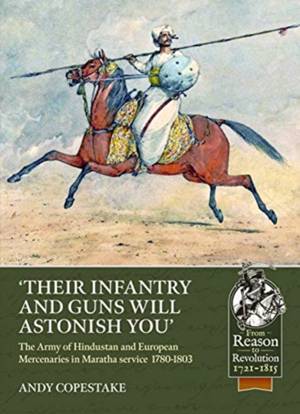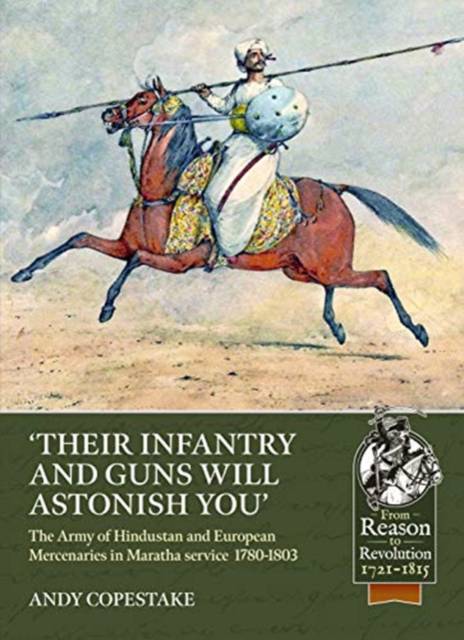
- Afhalen na 1 uur in een winkel met voorraad
- Gratis thuislevering in België vanaf € 30
- Ruim aanbod met 7 miljoen producten
- Afhalen na 1 uur in een winkel met voorraad
- Gratis thuislevering in België vanaf € 30
- Ruim aanbod met 7 miljoen producten
Zoeken
'Their Infantry and Guns Will Astonish You'
The Army of Hindustan and European Mercenaries in Maratha Service 1780-1803
Andy Copestake
€ 41,95
+ 83 punten
Omschrijving
By the middle of the eighteenth century, the Mughal Empire in India was in serious decline. The rulers of the various breakaway successor states faced a major military problem. Their armies were being effortlessly scattered by much smaller forces of European led and trained troops. Their immediate answer was to buy in specialist help in the form of European mercenaries to train their own troops in the methods of the victorious British and French.
This led to a number of so called 'Trained Brigades' of regular eighteenth century infantry and formidable artillery being added to the armies of many of the Indian Princes. This book details to most successful of these formations, the Army of Hindustan in the service of the Maratha Prince Madhaji Scindia and his successor Daulat Rao. From an initial force of two battalion raised in 1784 by the Savoyard mercenary Benoit de Boigne, the Army of Hindustan would eventually number over 30,000 men and almost 200 guns. It would be commanded by Europeans of many nationalities including English, Scottish, French, Irish, Italian, German, and Dutch officers. This formidable force's almost unbroken run of victories would only be broken by the Second Maratha War where the future Duke of Wellington would fight what he always considered the hardest battle of his career against a small portion of the Army of Hindustan.
This led to a number of so called 'Trained Brigades' of regular eighteenth century infantry and formidable artillery being added to the armies of many of the Indian Princes. This book details to most successful of these formations, the Army of Hindustan in the service of the Maratha Prince Madhaji Scindia and his successor Daulat Rao. From an initial force of two battalion raised in 1784 by the Savoyard mercenary Benoit de Boigne, the Army of Hindustan would eventually number over 30,000 men and almost 200 guns. It would be commanded by Europeans of many nationalities including English, Scottish, French, Irish, Italian, German, and Dutch officers. This formidable force's almost unbroken run of victories would only be broken by the Second Maratha War where the future Duke of Wellington would fight what he always considered the hardest battle of his career against a small portion of the Army of Hindustan.
Specificaties
Betrokkenen
- Auteur(s):
- Uitgeverij:
Inhoud
- Aantal bladzijden:
- 224
- Taal:
- Engels
- Reeks:
Eigenschappen
- Productcode (EAN):
- 9781914059773
- Verschijningsdatum:
- 26/07/2021
- Uitvoering:
- Paperback
- Formaat:
- Trade paperback (VS)
- Afmetingen:
- 180 mm x 246 mm
- Gewicht:
- 598 g

Alleen bij Standaard Boekhandel
+ 83 punten op je klantenkaart van Standaard Boekhandel
Beoordelingen
We publiceren alleen reviews die voldoen aan de voorwaarden voor reviews. Bekijk onze voorwaarden voor reviews.











